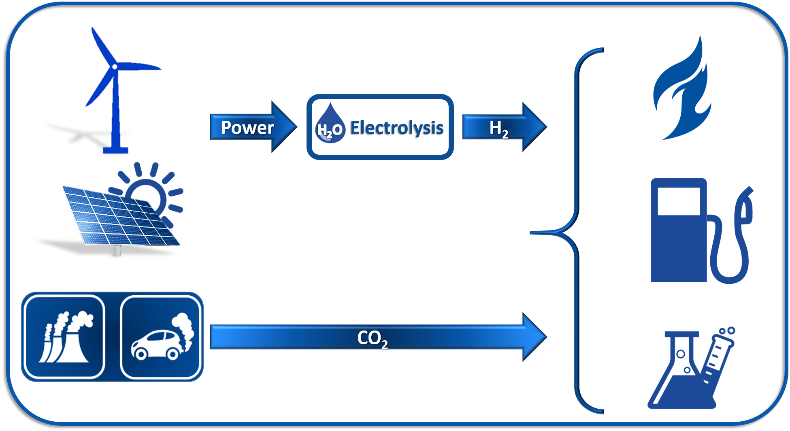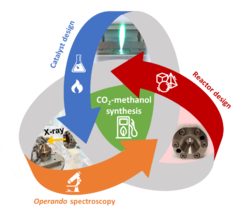Climate change and the global energy demands have led to increased efforts on efficient renewable energy storage aiming at a CO2 neutral approach. Closely related to this is the production of green hydrogen and synthesis gas (CO/H2), thermochemically or electrochemically. Our contribution in this direction is state-of-the-art research on catalyst development, process optimization and fundamental understanding.
Power2X
Synthesis of energy storage materials from CO and CO2
 Recent advances in renewable wind and solar energy generation have made this a viable long-term option for fulfilling the increasing energy needs of our society. There is, however, a substantial imbalance between the power production and its utilization capacity. In order to circumvent these issues, efficient energy storage solutions need to be developed. One example is the Power-to-X strategy, at the core of which is the conversion of CO/CO2 and H2 gas mixtures into fuels and intermediate chemicals. In this framework, our group deals with several aspects of the Power2X strategy, including water electrolysis, methanation, FTS, methanol and higher alcohols synthesis from CO/CO2+H2. The expertize we aim to bring into this global challenge is determining the catalyst behaviour under dynamic conditions that mimic nature’s character using advanced techniques, such as in-situ and operando XAS, EXAFS, etc.
Recent advances in renewable wind and solar energy generation have made this a viable long-term option for fulfilling the increasing energy needs of our society. There is, however, a substantial imbalance between the power production and its utilization capacity. In order to circumvent these issues, efficient energy storage solutions need to be developed. One example is the Power-to-X strategy, at the core of which is the conversion of CO/CO2 and H2 gas mixtures into fuels and intermediate chemicals. In this framework, our group deals with several aspects of the Power2X strategy, including water electrolysis, methanation, FTS, methanol and higher alcohols synthesis from CO/CO2+H2. The expertize we aim to bring into this global challenge is determining the catalyst behaviour under dynamic conditions that mimic nature’s character using advanced techniques, such as in-situ and operando XAS, EXAFS, etc.
Related publications (selection)
J. Geppert, P. Röse, S. Czioska, D. Escalera-López, A. Boubnov, E. Saraçi, S. Cherevko, J.-D. Grunwaldt, U. Krewer. J. Am. Chem. Soc. 2022, 144, 29.
Pandit, L.; Serrer, M.-A.; Saraҫi E.; Boubnov, A.; Grunwaldt, J.-D. Chem. Methods. 2022, 2, e202100078.
Czioska, S.; Boubnov, A.; Escalera-López, D.; Geppert, J.; Zagalskaya, A.; Röse, P.; Saraçi, E.; Alexandrov, V.; Krewer, U.; Cherevko, S.; Grunwaldt, J.-D. ACS catalysis, 2021, 11, 10043.
Escalera-López, D.; Czioska, S.; Geppert, J.; Boubnov, A.; Röse, P.; Saraçi, E.; Krewer, U.; Grunwaldt, J.-D.; Cherevko, S. ACS catalysis, 2021, 11, 9300.
Serrer, M.-A.; Stehle, M.; Schulte, M. L.; Besser, H.; Pfleging, W.; Saraçi, E.; Grunwaldt, J.-D. ChemCatChem, 2021, 13, 3010.
Serrer, M.-A.; Gaur, A.; Jelic, J.; Weber, S.; Fritsch, C.; Clark, A. H.; Saraçi, E.; Studt, F.; Grunwaldt, J.-D. Catal. Sci. Techn. 2020, 10, 7542.
M.-A. Serrer, K. F. Kalz, E. Saraҫi, H. Lichtenberg, J.-D. Grunwaldt. ChemCatChem, 2019, 11, 5018.
Methanol synthesis from CO2
The amount of energy produced by renewable resources like wind and solar is increasing. Fluctuating weather and seasonal circumstances require the possibility to store surplus energy, so it can be used even if the energy production is lowered due to natural conditions. Within the concept of Power-to-Liquid, green hydrogen produced by water electrolysis powered by renewable energy, and CO2 from the atmosphere are combined to form a liquid energy carrier, for example methanol. The synthesis of methanol from syngas (CO+H2 + 3-5% CO2) is a well-studied and applied process which requires an active catalyst. However, for a CO2-based methanol production new challenges arise e.g. catalyst deactivation due to higher water concentration and unfavorable thermodynamics in comparison to syngas feed. Therefore, catalyst- and process optimization is necessary. Within our research, we use flame spray pyrolysis and other techniques for catalyst synthesis, design and develop cells/reactors for spectroscopic applications e.g. X-ray spectroscopy with the aim to perform operando and in situ studies under realistic CO2 methanol conditions.
 Doctoral researchers: Mariam Schulte, Lorena Baumgarten
Doctoral researchers: Mariam Schulte, Lorena Baumgarten
Available positions for students
Fischer-Tropsch synthesis
CO2 hydrogenation into C2+-hydrocarbons using the Fischer-Tropsch synthesis (FTS) technology is an attractive way to mitigate the green-house effect and a highly important research topic in our group. Typically, CO2-FTS can be divided into two steps: (i) reverse water gas shift (RWGS) reaction to generate CO and (ii) sub-
sequent classical FT synthesis with CO. Fe-based materials are suitable candidates for this transformation. The on-going research focuses on developing catalysts with low methane selectivity but high selectivity to light (C2-C4) olefins and fuels. Alkali metal can be used as promoters to drive the selectivity to the desired products and improve the olefins/paraffins (O/P) ratio. However, the fundamentals of promoter-related improvements are still unclear. In collaboration with the group of E.V. Kondratenko from LIKAT (Rostock, DE) we aim at understanding the role of alkali promotors on Fe-based catalysts for the CO2-FTS using operando characterization.
Scientist: Dr. Erisa Saraçi
Available positions for students

Sustainable Aviation Fuel
Aviation accounts for approximately 3% of global CO2 emissions, with projected increase by 2-folds in the next 15 years. Sustainable aviation fuels (SAF), unlike conventional fossil fuels, are based on green hydrogen and atmospheric CO2 and can be obtained via the Fischer-Tropsch-Synthesis technology (FTS). With the help of optimized FTS catalysts, SAF can be produced more efficiently. Their "drop-in" implementation can significantly reduce greenhouse gas emissions in industries such as aviation, where conventional fuels are difficult to replace. Catalyst design and optimization are crucial for advancing in the efficient production of SAF. In this context, we focus our research to preparation of model catalysts as well as operando characterization of FTS catalysts with the aim to understand structural properties and deactivation phenomena. For this operando XAS high-pressure and high-temperature cell reactors are developed.
Doctoral researcher: Rabia Ilica
Available positions for students
| Topic | Title | Type | Supervisor |
|---|---|---|---|
| Power2X technologies | tbd | Bachelor/ Master Thesis | Dr. Erisa Saraci |

